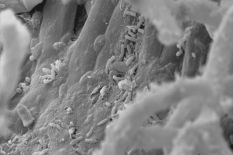New uni:view guest commentary by faculty member Dagmar Woebken

Dagmar Woebken contributed an article to the University of Vienna’s Semesterfrage with the overarching theme - “How can we protect biodiversity?”. In her guest commentary in the uni:view magazine, she discusses the immense biodiversity of microorganisms in soil and why this is of importance. The contributions of soil microorganisms range from the capability to absorb greenhouse gases to removing pesticides and pollutants from the soil. They further can have a beneficial effect on plants by supporting them with the uptake of nutrients and defending them against pathogens. The presence of numerous microbial species in soil contributes to the stability of biogeochemical processes under varying conditions. But how is it even possible that several thousand species of microorganisms coexist in one gram of soil? One factor that facilitates the high microbial diversity is the presence of various micro niches due to the heterogeneity of soil. Moreover, a high number of microbial species is maintained since many microorganisms are able to endure unfavorable conditions in a so-called ‘dormant state’. By minimizing their metabolic activity, they survive as part of the microbial seedbank and can become re-activated if the conditions change. Investigating the surviving strategies of soil microorganisms is a major research focus of Dagmar Woebken and her team. In the article, she further points out that the biodiversity of soil microorganisms is threatened, for instance by the extensive use of nitrogen fertilizers and the cultivation of crops in monoculture plantations. Due to the aforementioned importance of soil microorganisms, it should be of our highest priority to protect the soil microbial biodiversity.
Photo: © Raphael Gabriel, CIUS / Cell Imaging & Ultrastructure Research, Core Facility
